-
No-Code
Platform
-
Studio
No-code agentic platform delivering the fastest time-to-value and the highest ROI
-
Studio
-
AI-Native CRM
CRM
-
AI-Native CRM
New era CRM to manage customer & operational workflows
CRM Products -
AI-Native CRM
- Industries
- Customers
- Partners
- About

Customer relationship management can be quite a challenge for manufacturing companies to nail for several reasons. The mix of B2C and B2B operations, long sales cycles, high-value orders, and the need to maintain relationships with distributors can be tricky to handle without a proper manufacturing CRM solution.
Luckily, modern manufacturing CRMs can help companies tackle these challenges easily when chosen and implemented according to the unique needs of your business.
This article outlines the key features and benefits of CRM for manufacturing companies and offers a selection of 10 CRM solutions worth considering.
Why Manufacturing Needs CRM?
CRM, or customer relationship management, refers to software that helps organise and process customer data, documents like quotas or contracts, and business processes.
CRM software is typically used by customer-facing teams, such as sales, marketing, and customer service, manufacturing CRMs often extend their use to automate other business processes, like supply chain management and procurement management.
Defining “a customer” in manufacturing can be tricky. Most manufacturers sell their products through various channels, involving distributors and retailers. This means that, along with the final customer, manufacturers need to understand their retailer partners and build strong relationships with both. Such a mix of B2C and B2B business models requires strong data consolidation, and flexible automation workflows to handle multiple types of sales and other activities
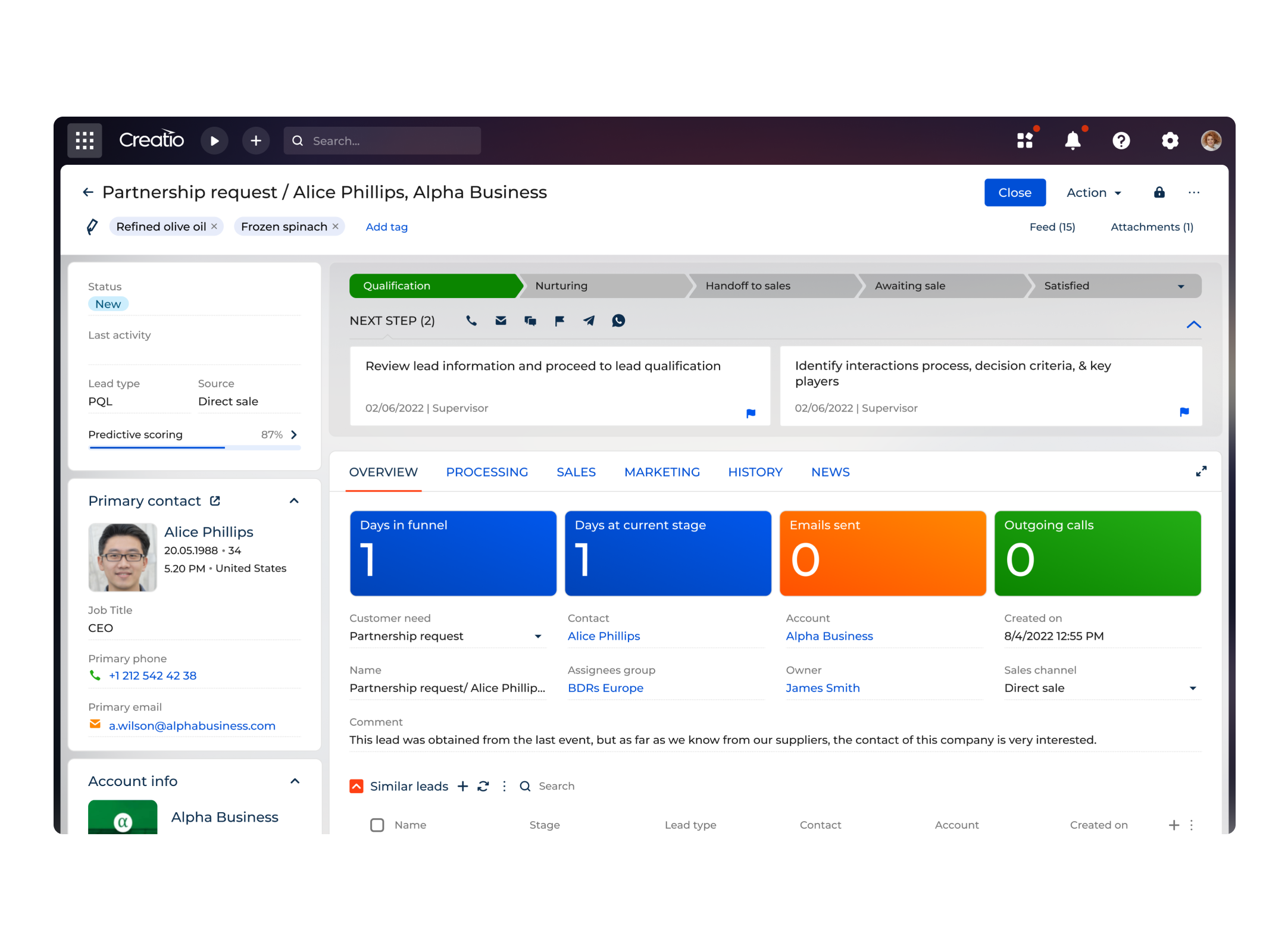
So, the main benefit of a manufacturing CRM is that it serves as a single source of truth, bringing together sales, marketing, customer service, distribution, partner management, and other functions. This helps manufacturers to efficiently manage their business without getting lost in duplicate processes and data streams, thus impowering the efficiency of all customer-facing activities and boosting employees productivity.
In such a way, CRM allows manufacturers to build more streamlined customer experience while improving operations.
10 Best Manufacturing CRM Software Solutions
After driving into research and and taking on board some helpful insights from customers, we picked out 10 top-notch CRM solutions that are perfectly suited for the manufacturing industry and offer the features listed above.
While some of these platforms are designed with manufacturers in mind, others vendors cater to a broader market but come with customisations tailored for manufacturing needs, right alongside their main CRM features.
Creatio
Creatio offers a no-code platform built on composable no-code architecture that enables you to automate workflows and CRM with the ultimate freedom. Its key strength lies in the combination of powerful CRM and business process management (BPM) tools, allowing you to create custom apps and features without needing to code. With simple drag-and-drop functionality, anyone can build their own automation solution.
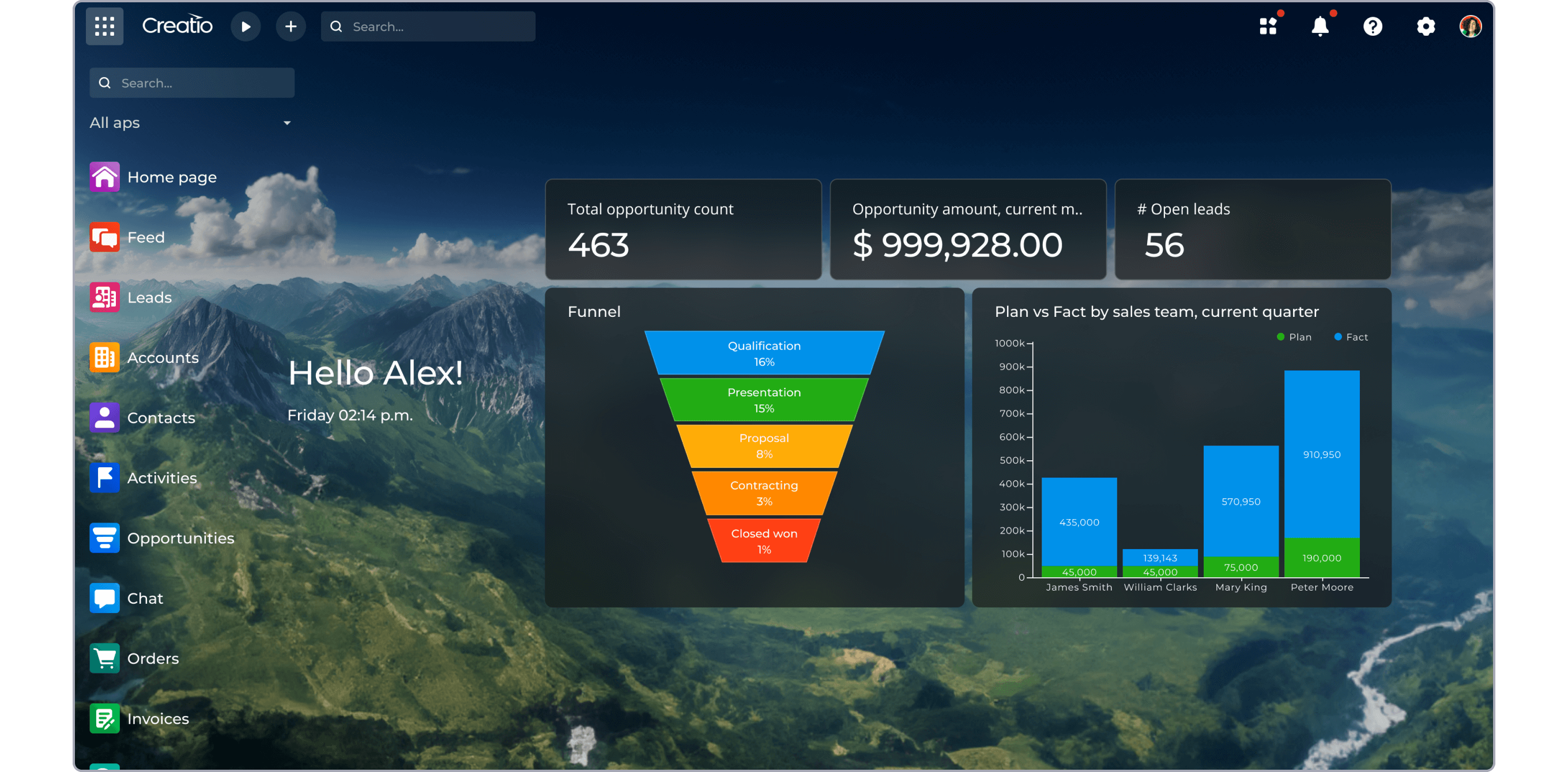
Creatio CRM includes three products for sales, marketing and service. The Sales product offers pipeline management features, providing complete control over your sales. You get a 360-degree view of each customer with access to their full information, engagement status, and history of interactions. Plus, leverage AI-powered sales forecasting for accurate predictions.
The Marketing product lets you dive deep into understanding your customers, quickly create target segments, handle complex marketing campaigns on various channels, ramp up lead generation, and increase conversion rates.
The Service product gives you a complete customer view, brings together all communication channels in one place, speeds up and streamlines the resolution of tricky issues and cases, and allows you to build top-notch automated service workflows.
Moreover, Creatio offers a range of manufacturing-specific functionalities, including order processing, product lifecycle management, procurement lifecycle management, supply chain planning and tracking, and more. With Creatio Marketplace, users can access ready-made apps designed to optimise processes related to production, distribution and logistics, inventory management, and beyond. Additionally , users have the capability to develop automated workflows and apps using no-code tools, eliminating the need for IT developers. Creatio integrates AI and machine learning tools across all its products, using them for scoring, prioritisation, data analysis, and recommendations.
Creatio is a perfect choice for manufacturers looking for a powerful CRM that will adapt to their business needs.
Pros:
- A unified no-code platform to automate CRM and manufacturing workflows
- Limitless customisation powered by no-code, user-friendly UI
- A suite of turn-key manufacturing-specific capabilities
- Powerful analytics and reporting
- Transparent pricing
Cons:
- Deployment may take time
- Requires practical employee training
Pricing
As for pricing, Creatio offers a composable pricing model, allowing you to choose functionality you need. The base no-code Creatio platform costs 40 AUD (~$25 USD) per user/per month. Free trial is available.
Want to Boost Your Manufacturing CRM Business?

FreeAgent
FreeAgent CRM is a cloud-based CRM solution designed specifically to small businesses. FreeAgent's manufacturing CRM offers pipeline management, lead tracking, and reporting capabilities. It comes with pre-built integrations for key connectors like Quickbooks and Outlook, and you can easily build additional connectors with Zapier's no-code tools.
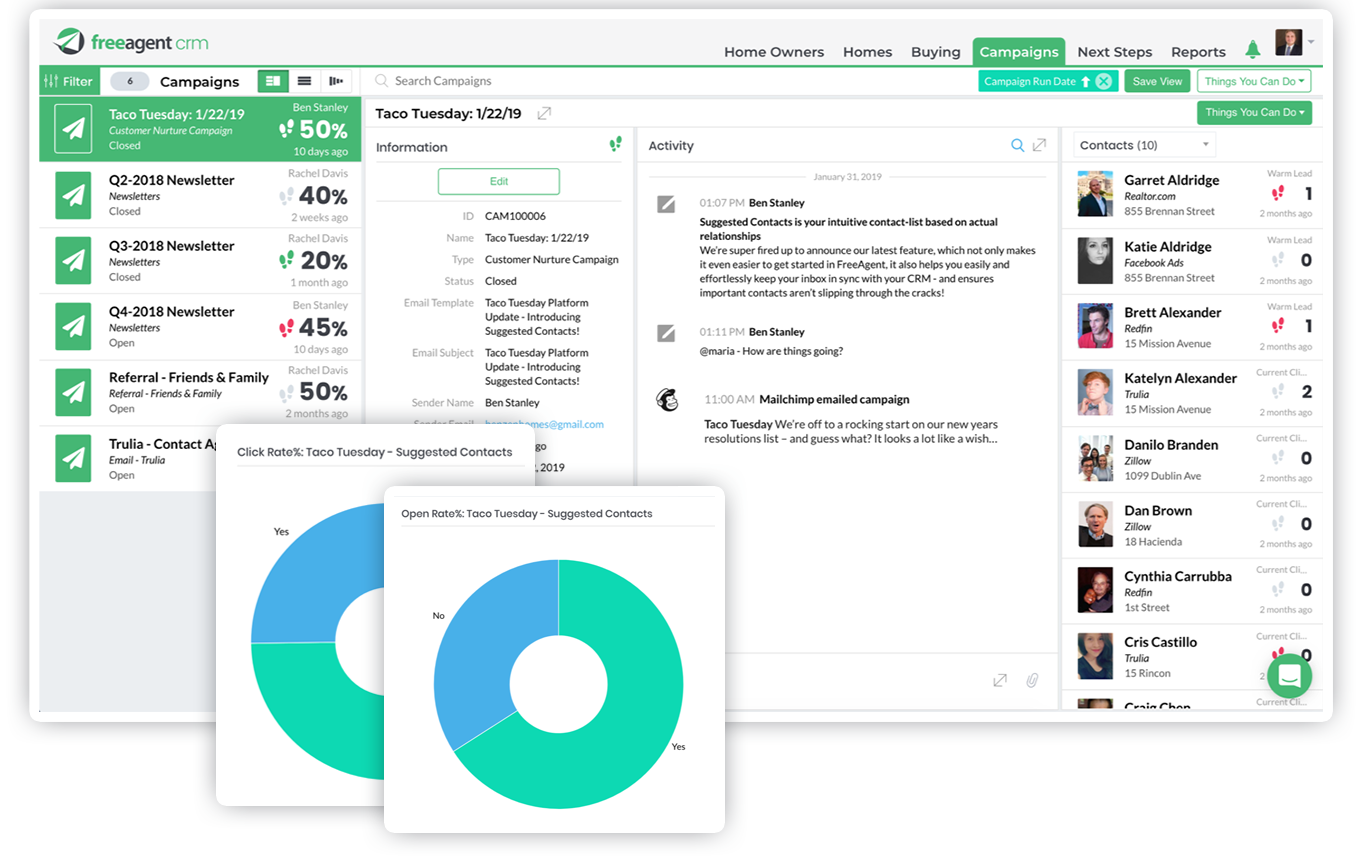
Its user-friendly interface makes it an ideal choice for manufacturing companies seeking a straightforward CRM solution.
Pros:
- Flexible and customisable
- Quick and responsive customer support
- Easy to use
Cons:
- Reporting capabilities are not as advanced as other CRMs
- No mobile app for remote work
Pricing
The “Starter” plan goes for 29 AUD (~$18 USD) per user/month; “Team” for 44 AUD (~$28 USD)per user/month, and “Pro” for 95 AUD (~$60 USD) per user/month.
HubSpot CRM
HubSpot is well-known for its marketing automation platform, boasting a great range of tools for inbound lead-generation. It also offers a comprehensive CRM solution. It helps manage relationships with distributors and retailers, segment your leads, and create personalised marketing content using AI.
While HubSpot's integrations library isn’t as extensive as some other tools, it covers the essential manufacturing integrations. Its automated features streamline lead generation, saving valuable time and boosting overall sales and marketing efforts for businesses.
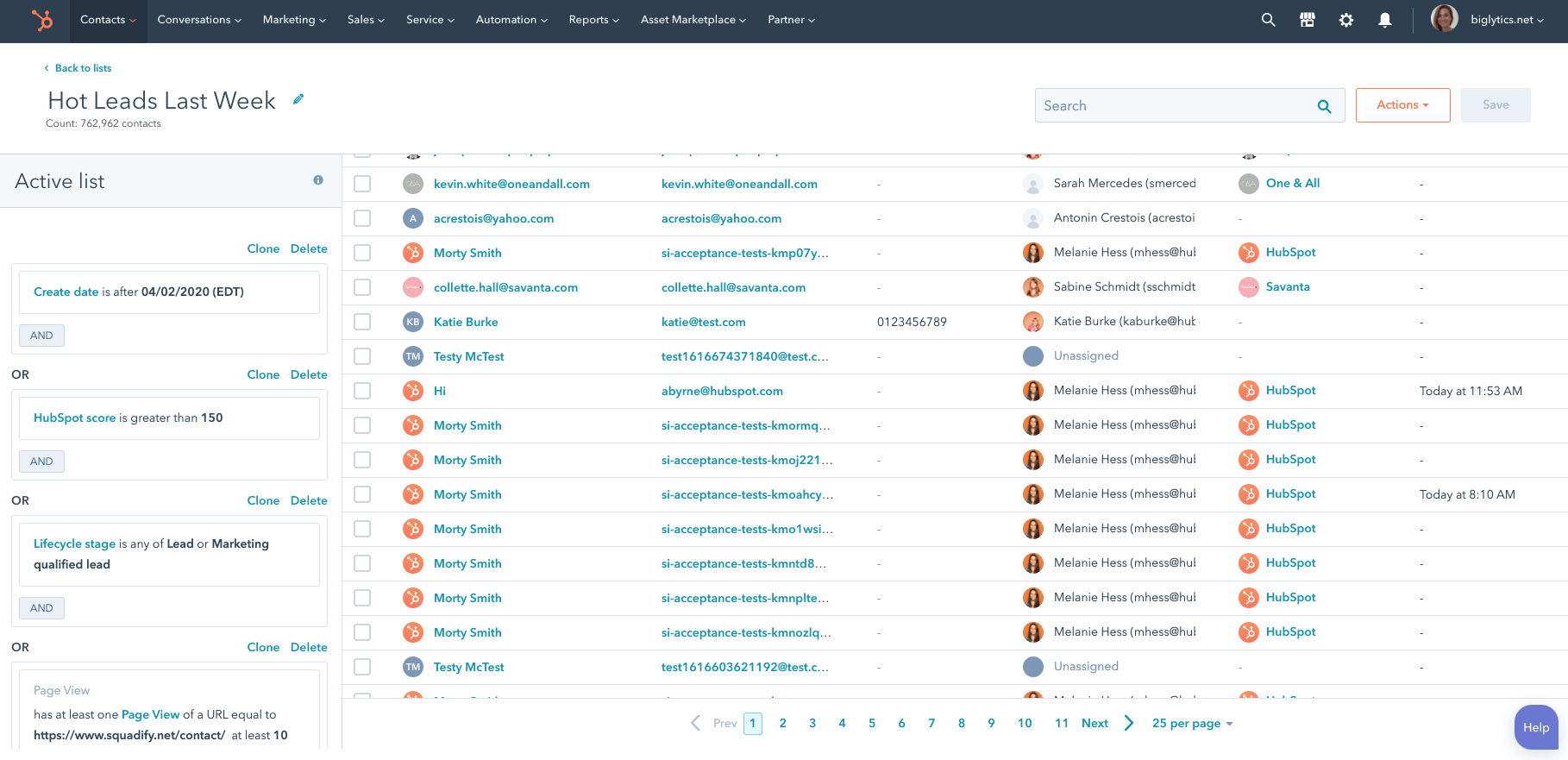
HubSpot CRM is well-suited for manufacturers in search of an easy-to-use CRM with strong marketing tools.
Pros:
- Powerful marketing automation tools and analytics
- Easy to set up
- User-friendly UI
Cons:
- Limited customisation options
- Targets Enterprise-level businesses in its pricing
- Inability to purchase CRM modules unbundled
- Limited number of integrations
Pricing
Free version available. The paid version of Hubspot CRM starts at 2497 AUD (~$1575 USD) per month, including 5 paid users.
Zendesk Sell
Zendesk is mainly recognised for its customer service platform, but it also offers Zendesk Sell, a solid CRM system for any industry. This solution is designed to boost productivity of customer-facing teams and improve lead conversion with effective sales engagement tools.
Given its background, the standout feature of Zendesk Sell platform is the customer service product, which includes task management, contact centre, and multi-channel communication options.
Additional features include sales engagement tools, customisable customer data lists and templates for leads and deals, user-friendly reports, and a library of over 100 integrations.

Consider adopting Zendesk Sell if you're after a simple and cost-effective solution with a comprehensive marketplace for integrations
Pros:
- Quick onboarding
- Affordable pricing models
- Proven customer service tools
Cons:
- Limited customisation capabilities
- Few marketing tools
Pricing
The pricing starts at 40 AUD (~$25 USD) per user/ month.
NetSuite
NetSuite’s main offering for manufacturers combines an ERP (Enterprise Resource Planning) platform with a powerful cloud-based CRM.
It provides many tools covering key manufacturing needs, like order management, supply chain management, shop floor control, and procurement. CRM features cover sales force automation, marketing automation, and customer service and support management.

NetSuite is ideal for enterprise-level manufacturers with global operations looking for a unified platform for analytics and business automation.
Pros:
- A comprehensive suite of ERP and CRM features build for manufacturers
- Powerful analytics
- Lots of integrations
Cons:
- Requires time to set up
- Steep learning curve for adoption
- Third-party integration can be challenging without a specialised support team
Pricing
Pricing for this CRM for the manufacturing industry is calculated on a custom basis.
Monday.com
Monday CRM is a flexible and easy-to-use CRM platform designed to streamline workflows and boost team collaboration. With customizable features and integrations, Monday CRM helps with efficient project management, task tracking, and communication, empowering businesses to hit their goals effectively.
It offers manufacturing templates to help users manage production processes and organise data. However, more advanced manufacturing capabilities, like supply management, are missing.
Monday.com is a top choice for companies looking for an affordable and user-friendly platform for sales engagement and productivity.
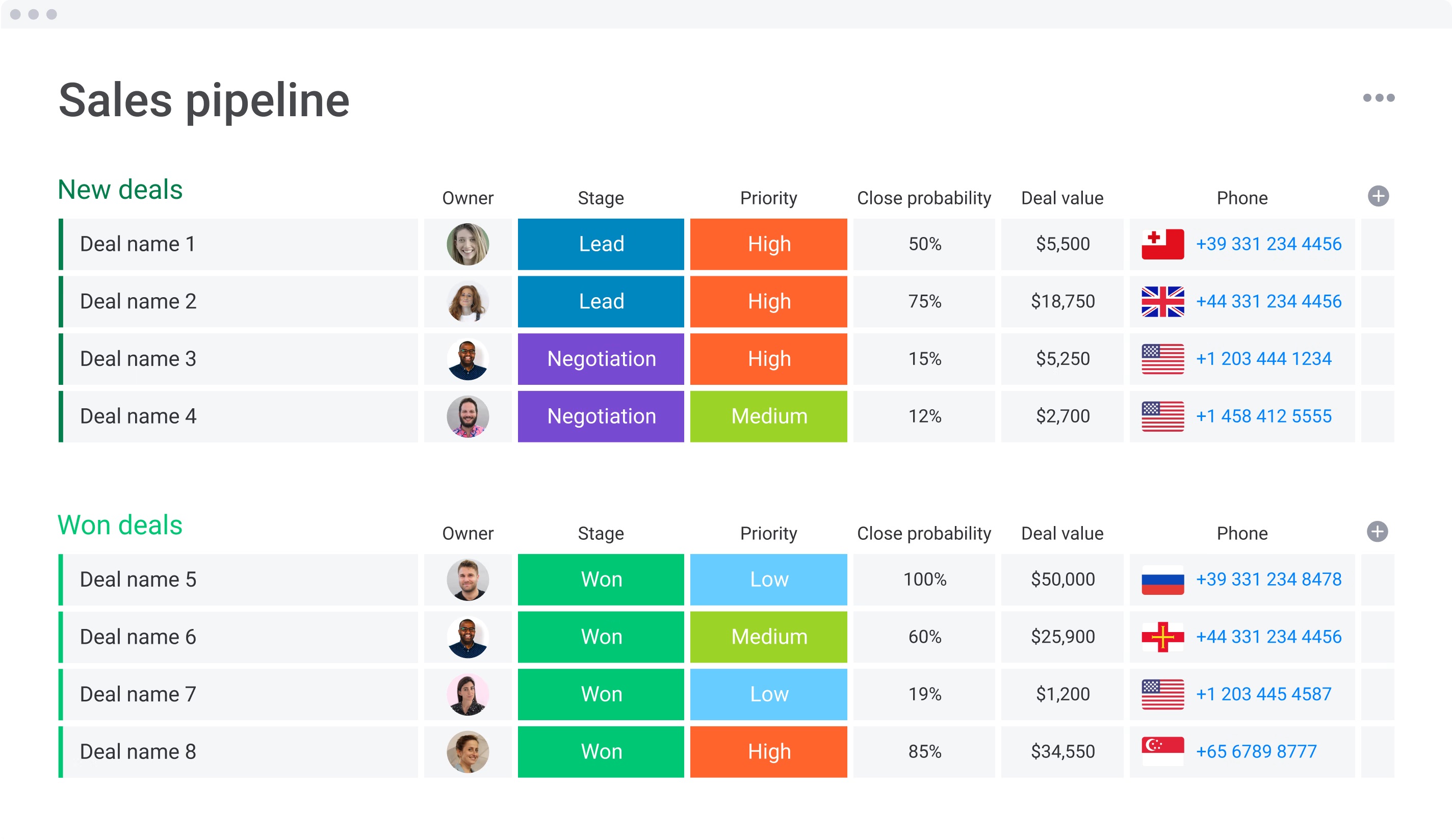
Pros:
- Easy to use
- Offers manufacturing templates
- Great for collaboration
Cons:
- Weak reporting
- Underperforming marketing automation tools
- A limited number of integrations
Pricing
The pricing for Monday CRM starts at 22 AUD (~$14 USD) per user/month.
SpotlerCRM
Spotler CRM is a comprehensive CRM system designed to optimise marketing, sales, and customer support strategies.
It offers robust features for lead management, email marketing automation, and campaign tracking. With user-friendly tools and analytics, Spotler CRM gives businesses the power to generate, nurture, and convert leads effectively while boosting overall customer engagement and retention efforts.
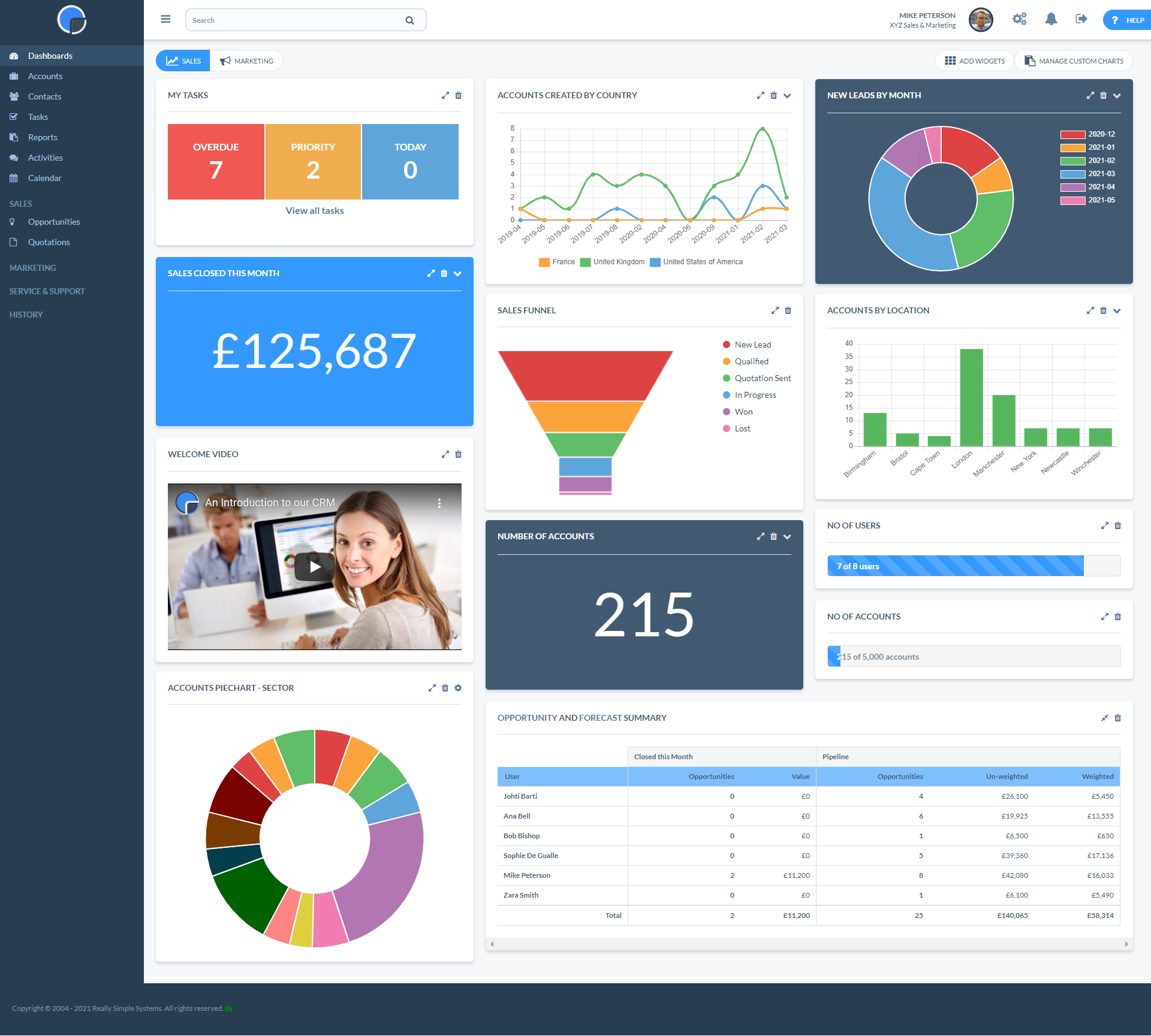
Consider SpotlerCRM if you're looking for an easy-to-use straightforward solution to track your sales, marketing, and service activities.
Pros:
- Offers Zapier-powered integrations
- User-friendly UI
- High-performance marketing tools
Cons:
- Limited customisation options
- Weak reporting tools
Pricing
Free trial available. The pricing starts at 55 AUD (~$35 USD).
Keap CRM
Keap CRM is an ideal option for manufacturers seeking a thorough CRM solution with automation perks.
With Keap, you get customisable pipelines and stages to smoothen sales processes, plus its e-commerce integration can give revenue growth. But it’s worth noting that customisation options for reports are limited, and there is no built-in telephony feature.

Pros:
- E-commerce integration
- Potent marketing capabilities
- Advanced reporting and analytics
Cons:
- Limited customisation options
- No built-in telephony feature
- Subpar mobile app
Pricing
The pricing starts at 315 AUD (~$199 USD) /month and includes 1500 contacts and two users.
Infor
Infor CRM is a comprehensive cloud-based app designed to streamline all things CRM. It offers functionalities tuned for sales, customer service, marketing analytics, and reporting, all bundled up in one platform.
What sets Infor apart is its smooth integration with its own manufacturing ERP solution created specifically for global manufacturers. It gives companies a possibility to boost visibility and automation, letting them respond promptly to customer demands, supplier needs , and regulatory standards without fussing over hefty software customisations. With the ERP platform, you’ve got supply management, manufacturing execution system, and product lifecycle management tools all at your fingertips.
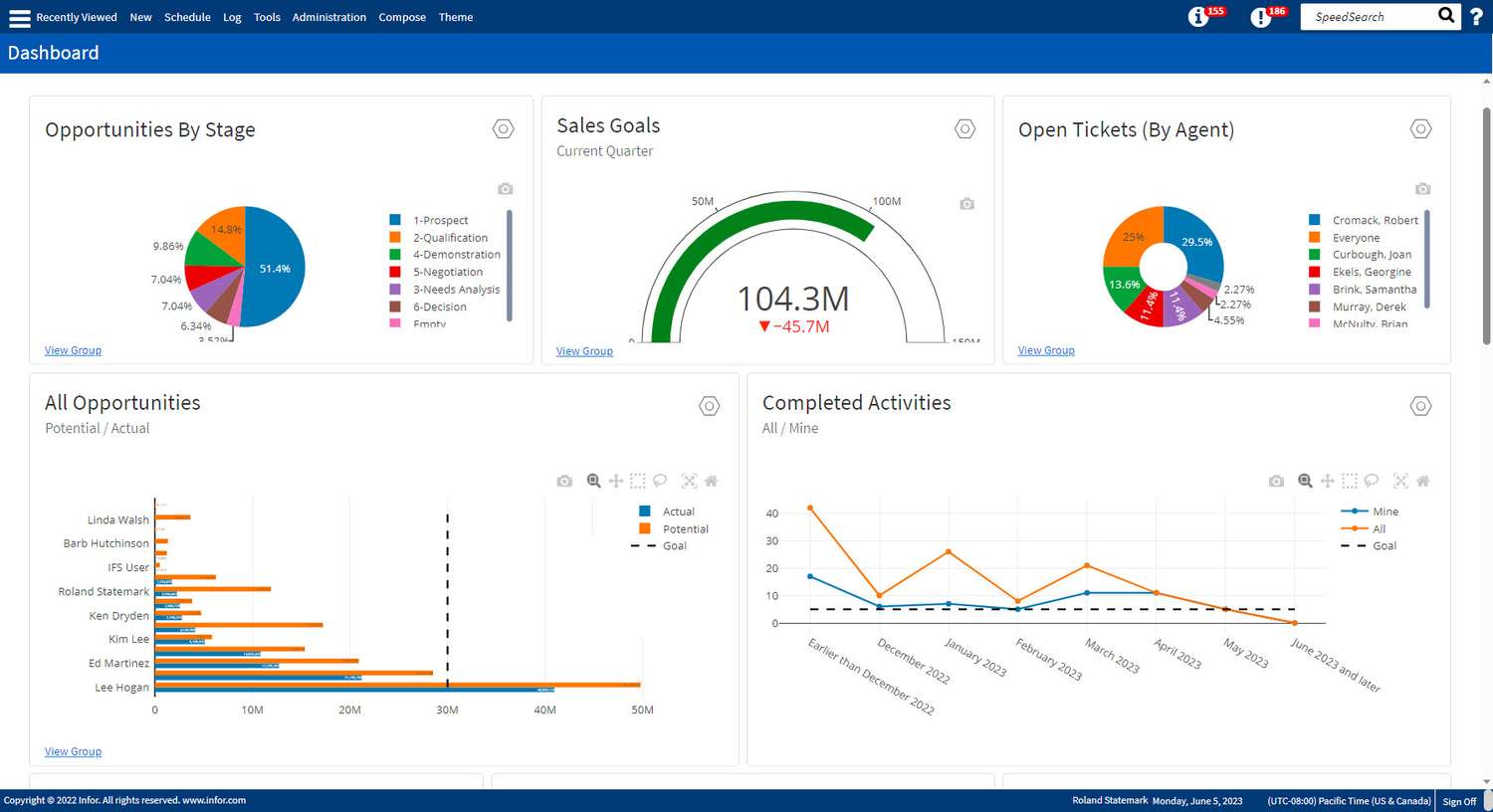
This CRM is a great choice for global enterprise-level manufacturers looking for an end-to-end CRM and ERP solution.
Pros:
- Seamless integration with Infor ERP
- Scalable and customisable CRM
Cons:
- Poorly designed interface
- Lack of CRM integrations outside of Infor's ecosystem
- Requires a lot of training
Pricing
Pricing is available on request.
NetHunt
NetHunt CRM is a cloud-based platform specifically designed to sharpen up sales and customer service operations.
It offers robust features for handling customer interactions, tracking sales pipelines, and tidying up your data. Its key advantage is pre-built integration with GSuite. This means you can effortlessly connect your CRM with Google products like emails and calendars.
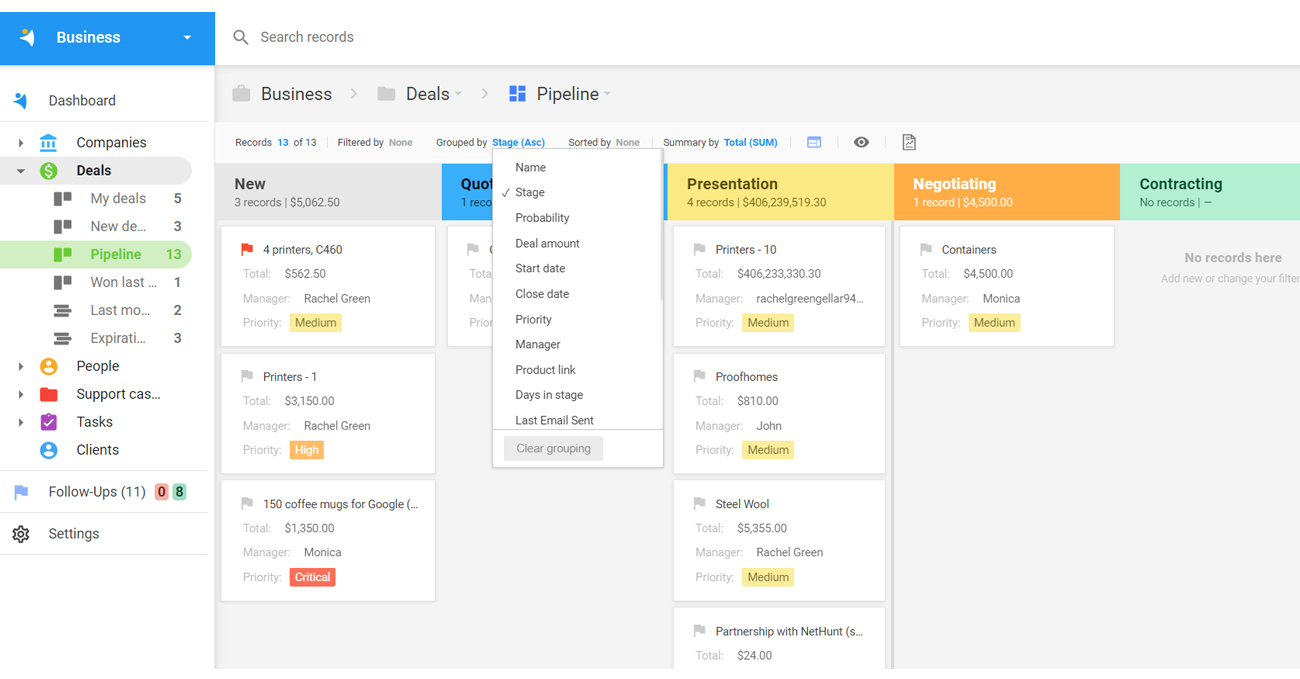
NetHunt CRM smooths out your communication, personalised outreach, and automates workflows, making it a flexible solution for big and small businesses wanting to leverage their sales and customer management processes.
Pros:
- Built-in integration with Google products
- Intuitive interface
- Quick set up
Cons:
- Limited integration options
- Learning curve that comes with adoption
- No built-in telephony features
Pricing
Free trial available. The pricing starts at 47 AUD (~$30 USD) per user/month.
Top Benefits of Manufacturing CRM
Let's take a closer look at the benefits of a manufacturing CRM and explore how it improves customer relationships and production planning.
Increased sales
A CRM system brings together all your sales activities. This means your sales team can efficiently handle communications with prospects across different channels in one place, saving them from being swamped with multiple screens.
Centralised data management also means sales reps get a full view of the customer, helping them build stronger relationships and trust. They can respond quicker and tailor their approach to meet the lead's needs. Plus, with marketing automation features, a CRM lets you set up automated but still personalised campaigns that bring more leads to your pipeline.
These features significantly boost the chances of successfully closing deals with new clients and uncovering more cross-sell and upsell opportunities with existing customers.
In the end, having an organised sales team and a well-managed sales pipeline leads to better performance and more deals closed.
Improved customer engagement
Having one source of truth for customer information sets the stage for building personalised communication and stronger relationships. With CRM, you can ensure that you don't lose track of the existing customers and leverage previous relationships to generate new sales through automated retention campaigns.
CRM makes it easy for your customer service teams to quickly respond to inquiries by presenting all the necessary info and contacts in one place, while also automatically sorting and prioritising customer requests.
Top-notch customer support and well-nurtured relationships encourage higher levels of customer satisfaction and increased loyalty.
Improved productivity and collaboration
CRM systems bring together different front-office departments and make it easy for them to share customer info. For example, customer service agents can see what communication channels a customer preferred during the sales process and use them when handling service requests.
By centralising data from various departments and making it easy to share, CRM systems boost collaboration among different teams, improving productivity in general.
On top of that, CRM software comes with task management features that let managers organise their teams’ work and track employees’ performance.
CRM automation slashes the time spent on routine tasks like follow-ups and approvals, freeing up teams to focus on more impactful work.
Better demand forecasting and production planning
A CRM gives your sales team the power to predict revenue growth using their existing pipeline of potential deals and past sales data. With sales forecasts in hand, you can plan, schedule and allocate resources well in advance, rather than waiting for customer orders to roll in.
By gathering all the customer info and audience analysis insights in one place, CRM software processes this data to make accurate predictions about customer demand. This means you can tweak your production plan to match, avoiding overproduction or delivery.
Supply chain visibility
CRM makes it easier to handle supply chain management by giving you real-time data from operations, inventory management, order processing, warehousing, and distribution chains.
With clearer insights into these processes, businesses can effectively handle production schedules, keep inventory levels optimised, and gain advantages in purchasing and procuring materials.
Informed decision-making
A CRM system gives managers the tools they need to make informed decisions and optimise processes. By displaying key business metrics on a single dashboard, executives can quickly identify growth opportunities and areas of risk, allowing them to make decisive action when needed.
Essential Manufacturing CRM Features to Consider
CRM vendors typically offer a standard set of features to support sales, marketing, and service teams. This list outlines both common functionalities and those specific for manufacturing, letting manufacturers fully utilise CRM platform.
Lead and pipeline management
A CRM should give your sales team full control over the pipeline, automating the process of tracking, scoring, and assigning leads to sales reps. This boosts conversion rate and helps identify weaknesses in your sales strategy.
Sales forecasting
This feature in a CRM lets users create sales forecasts using their current pipeline and past sales data. The top-notch CRMs allow you to tweak forecasting models and algorithms, choosing which parameters to factor in and which datasets to trust.
Campaign management
A quality CRM system should provide tools for managing campaigns, allowing you to create, automate, and analyse personalised marketing campaigns.
Customer service management
Service CRM applications usually come packed with features like a comprehensive 360-degree view of the customer, contact centre, and task management to assist customer support teams. Make sure the chosen CRM offers omnichannel customer communication, covering phone calls, emails, and social media chats.
Order processing
For manufacturers, automating order placement and validation through a CRM can be a game-changer, saving significant time on manual processing. Some companies may choose a separate tool to manage orders but integrating it in your CRM is more convenient and allows you to quickly connect customer service reps in case of order issues.
Supply chain management
This feature lets you keep track of all production input, automate shipment scheduling, and cut down on production downtime via automated delivery processes. You can sync product data across multiple divisions and receive real-time updates on supplies and shipments. This feature is specifically made for manufacturers, it might not be available in a general CRM. It’s wise to check with the vendor if they offer supply management tools.
Customisation
A good CRM should offer customisation options, allowing manufacturers to craft that suit their unique needs and preferences. This adaptability empowers you to scale the platform as your team and business grow, sparing the hassle of all your data migration and configurations to a different system.
Integration
Being able to connect with other platforms is a key option in manufacturing CRM. It’s important to pick a solution that smoothly integrates with your current manufacturing software stack, whether its accounting and logistics software, email services, etc.
Analytics and reporting
A big part of what makes CRM so valuable is its powerful data analysis. A top-notch CRM system should offer customisable dashboards and strong reporting features that handle data inputs from all sources.
Partner relationship management (PRM)
PRM features help you streamline communication with your partners like retailers and distributors. They let you team up on marketing campaigns, keep track of your partner's sales, manage returning orders, etc.
These capabilities provide insights into key performance indicators, helping you predict future sales and making better-informed business decisions
Boost Your Manufacturing Business With CRM
Choosing the right CRM for manufacturing can be a game-changer, boosting your business operations and lifting performance. Top-notch CRM systems support partner management, automate marketing processes, and facilitate lead generation. Plus, they are all about getting everyone on the same page, from your customer-facing teams to internal departments within a manufacturing company.
Creatio is the best choice for companies looking for a powerful CRM that offers functionality tailored specifically to manufacturing processes. Sign up for a free trial to see how easy it is to streamline your operations with Creatio.





















































